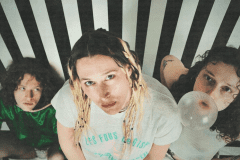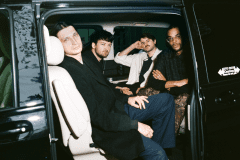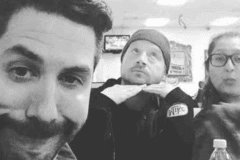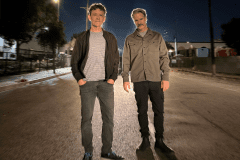Portugal is the oldest country in present-day Europe, they say: founded in 1128 with its borders largely unchanged since the end of the “reconquista” in 1249, from the Minho Province to the Algarve. Long before that, the Romans called it Lusitania, as before them it was home to several Celtic tribes, with central Portugal being home to one of the main tribes who fought the Romans, the Lusitanians.
Music has strong roots in Portugal, long before Fado was invented: Arabic influences are felt to this day. It is a country rich in a wide regional variety of chordophones and other instruments on the verge of extinction. These, we very affectionately call the Lusitanian Ghosts: the Amarantina, Braguesa, Campaniça, Terceira, Beiroa… with string combinations and tunings as varied as the several regions of Portugal.
Portuguese-Canadian indie rock n roller Neil Leyton’s last album, The Betrayal of the Self, was recorded in Sweden in 2006. Returning to his home country of Portugal in 2008, it has taken Leyton 10 years to soak up enough history to assemble the Lusitanian Ghosts collective: Swedish guitarist and singer Micke Ghost picked up the viola Amarantina; Vasco Ribeiro Casais, aka Omiri, plays the viola Braguesa and the Swedish medieval Nyckelharpa; O Gajo is re-inventing the viola Campaniça; Primitive Reason’s NYC native Abel Beja plays the viola Terceira, from the Azores; and Leyton, along with the viola Beiroa, has gone back to playing the bass (which he hadn’t done since the days of Passion’d Flower, his high school band in Toronto) anchoring the proceedings along with drummer João Sousa.
The Lusitanian Ghosts’ debut album was recorded at Canoa Studios in Torres Vedras, Portugal, by Nelson Canoa, who also plays some piano and Hammond on the album. The record was produced by Ricardo Ferreira (Blim Records) and mastered in California by John Golden.
Ghettoblaster recently caught up with Leyton to discuss the project and record, which hit the streets in June via Lusitanian/Altafonte.
When did you first begin writing the material for Lusitanian Ghosts?
After moving back to Lisbon, Portugal, from London, England, it just made sense to write about more localized themes, what it feels like to be back in my home country, after living abroad for so many years.
Tell us a little about yourselves. You all come from different countries. Is that right?
Most of the musicians and artists in the Lusitanian Ghosts collective are actually from Portugal except Micke Ghost, who is Swedish. I just lived abroad for the better half of my life, in Canada… so you could so it is an international collective but not so international as like, the Bad Seeds for example…
How did the idea come up to record with archaic instruments, like the chordophone?
I inherited a couple Portuguese chordophone string instruments that I could not really identify, from my grand-father, Mestre Adelino Leitão. Then the expert luthiers APC Instruments made some new contemporary chordophones from old models like the viola Beiroa, Campaniça, Amarantina and Toeira and gave them to Guillermo de Llera and Abel Beja from Primitive Reason, for a project called The High Djinn… i borrowed Abe’s Beiroa and it sort of started there…
The video for “Trailer Park Memories” is beautiful. Forgive our ignorance, but is that a chordophone that the boy is walking around with?
Hey listen, no need to apologize for asking questions! There are no ignorant questions, only ignorant answers. So, in answer to your question, indeed that chordophone the boy buries or hides for the future generations to find is indeed a real life viola Beiroa. Not really an old one, as they wouldn’t allow them out of the museums, so we faked the scene with a new Viola Beiroa from APC Instruments. It was meant to be an old Beiroa, but they’ve almost gone extinct so we couldn’t find a vintage one for the video. Now the other bit of dishonesty going on there is that the Beiroa isn’t actually one of the chordophones we play on that song: we used the Braguesa, Terceira and Amarantina on that recording, not the Beiroa. But the other guys were on the road when we shot the video; Micke wasn’t in Portugal with his Amarantina; so I borrowed Abe’s Beiroa again, which I only played on the record on “Past Laurels” and not “Trailer Park Memories”.
“The World” is our current fave from the record. What is that song about?
Ah, interesting question that. It’s sort of an outsider’s perspective looking in on someone who might not live to regret their entire life… which could have turned out alright on a different planet, but not ours. It’s hard to say much more about it because I went after the sound of the words and not so much the meaning… it’s more of a mood, a feeling, left up to interpretation really. Most of my favourite lyrics are not cut and dry that way, being about this or that specifically… know what I mean?
What artists are you listening to these days? Any artists we should be aware of?
Well, within the Lusitanian Ghosts collective of course we have myself, OMIRI and O Gajo, and you should definitely check out their respective projects! As well as The High Djinn and Primitive Reason.
As for other artists, to be honest I have been listening to the new Arctic Monkeys album non-stop… it’s like Ziggy Stardust part III – I heard it for the first time overnight at Copenhagen airport on my way back from SPOT festival to Lisbon, and it really is a masterpiece… so it’s not anything you’re not already aware of, but it is genius: Tranquility Base Hotel” and Casino.
Other than that, some references we had while making the Lusitanian Ghosts album? Scott 4 by Scott Walker, The Albatross by Thirsty, and the XIXA album – which sort of showed us you can mix traditional instruments and traditions into modern day rock n roll. I’m also a fan of Brian Lopez’ first solo album, Ultra. The song “Montjuic” is killer. Which is also the title of a XIXA song, haha.
What’s next in the world of Lusitanian Ghosts?
The vinyl gatefold LP will be out in October with custom-made oil-painting by Alenxandre Alonso as the cover art. We will probably play some shows in Portugal and Sweden after the vinyl release. And Micke and I have already written a new six-song EP based only on the chodophone sound, without bass and drums and the rest of the traditional rock band format. Actually the 4 of us, Micke, myself, O Gajo and Omiri have played a couple promo radio sets just with the three or four chordophones and vocals, totally acoustic, and you know what, the songs actually work that way too – so we may have two live line-ups ahead of us, the full band setup and the chordophone old school Fado house or barbershop version! Who knows. But the new songs might lead to a new EP or even a new album coming in 2019…







Social Media